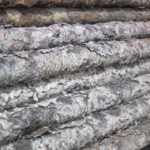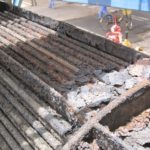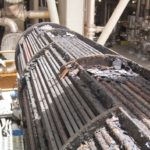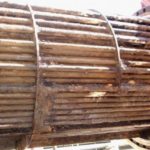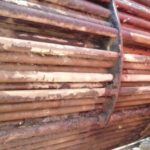Fouling describes the build-up of scaling, corrosion or sludge and debris in pipes and machines. In Oil and Gas industry this can play a big role in the processing. Depending on the composition of the hydrocarbon/crude the problems with fouling start at the well.
In the separation plant, the hydrocarbon is heated by a reboiler to release the included gas fouling is even more likely to occur. The same applies to the emulsion treatment and refineries.
Apart from the hydrocarbon side fouling is also an issue in cooling water and heat exchangers when processing the hydrocarbon. The higher the temperature rises, the heavier the fouling gets.
Cleaning Heat Exchangers
Cleaning is done during a regular shut-down every 3-5 days. The maintenance has to clean the pipes mechanically as well as chemically. The shut-down itself and the cleaning effort produces tremendous costs.
Without regular cleaning, the performance of the heat exchanger decreases quickly. As the inner wall of the pipelines is crusted with sediments, the heat transfer isn’t as efficient as with clean pipes. Therefore the cooling or heating capacity is reduced.
Reducing the fouling with Merus
Installing a Merus at the pipes affected reduces the fouling in pipelines and machines. The design of the plants and the ingredients of the crude oil differ. Therefore it is difficult to predict, in which time and to what extent the fouling is reduced. For the water side (cooling water and heating) it is easier to estimate these factors. For hydrocarbon we usually use existing data and data we collect during a trial phase for approximate values.
The cases of the past show that a step by step reduction of fouling always leads to savings due to increased process reliability.
Saving maintenance costs
Not only cleaning but also frequent replacement of wear parts causes costs. These are reduced significantly after the installation of our Merus Rings. The lifetime of the equipment is increased and downtime is reduced.
Apart from that the performance of the heat exchangers ist stabilized which means, less energy is needed to hold their level of heating capacity. The efficiency of these machines is far better than before and process reliability is ensured.


